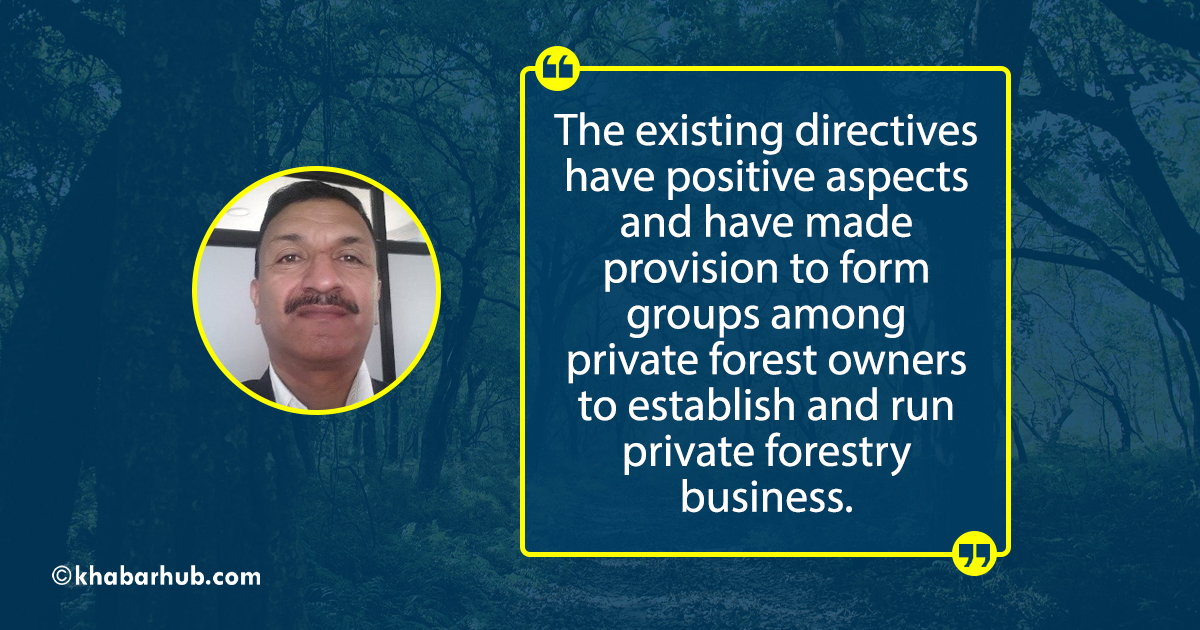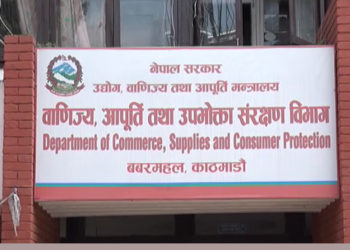Family Private Forestry is becoming popular in Nepal. It has become a sustainable income source not only to uplift the livelihoods of many farmers but also contributing towards gross domestic products of the country.
Despite various efforts made by the government, private forest owners and farmers are still suffering from various hurdles including access to private trees and benefits from the private property.
Restructured Nepal has envisioned three tiers of governments in Nepal. The farmers are seeking administrative and technical support from the local government.
Because the local government is collecting tax from private land where farmers are growing and protecting trees and non-timbers forest products. Hence, the local government must include a private forestry program in the yearly budget.
The existing directives have positive aspects and have made provision to form groups among private forest owners to establish and run private forestry business.
The federal government has enacted private forestry-related laws called “Private Forest development Directives in 2012 which is still to be implemented so far.
It shows that the translation of legal provisions into practice is lacking. Therefore, in the changing context, the local government should reinforce and improve the existing directives and bring them into practice as soon as possible.
The existing directives have positive aspects and have made provision to form groups among private forest owners to establish and run private forestry business.
It could encourage farmers who are engaged in forest farming for a long time and also an open window of opportunities to the energetic Nepalese returning from overseas due to COVID-19.
Most important point is that abundance and fragmented private land could be utilized by forming groups based on the landscape and business potentialities.
Nepal has better experience in registration of private forest and works with the management plan as envisioned in the Master Plan for Forestry Sector in 1988.
Even after three decades, there are only 2458 private individuals who registered 2360 hectares of their forest as Private Forests.
Now the role of local government is to promulgate new Family Private Forest Act and regulation with provisions of free and fair use of all species, both timber and non-timber, private property as envisioned in Nepal’s Constitution, 2015.
On the other hand in practice, as per data made available from the Federal Ministry of Forests and Environment, more than 13.2 million cubic feet timber produced and supplied in the market during the Fiscal year 2018-19, which is about 68 percent of total timber production in Nepal.
Therefore, the local government should make simple arrangement to register the private forest as family forestry and support to prepare and implement business plans which could attract and ensures new generations for working at home rather moving around the world.
Recently, the federal government decided to flexible for some species through an amendment in 2015 to Forest Regulations, 1995.
As per this amendment, farmers can now directly harvest, sell, and transport of 23 common tree species, except Sal, Asna, in principle which is mostly grown on private but in practice, the existing procedures have remained as it was before in most of the districts yet.
Now the role of local government is to promulgate new Family Private Forest Act and regulation with provisions of free and fair use of all species, both timber and non-timber, private property as envisioned in Nepal’s Constitution, 2015.
At the same time, the local government should establish Forests and Environment Unit and run an effective process, reporting and strong monitoring system.
Similarly, the provincial government should encourage family private forest owners whiling approving land-use plans of local government in the concerned province. It could be initiated by conducting private forest resource assessments in the province.
Because there were no practices to conduct an inventory of private forestry in Nepal so far. Further, the provincial government should provide sufficient funds to implement an adaptation plan to cope with climate change impact so far.
It should be recognized that farmers the right holders of community-based forestry who are being engaged to protect about 40 percent forests of Nepal.
Besides, the provincial government should encourage to family forestry by providing grants to run large scale forest enterprises.
It is well known that the family forest has a very big contribution to conserving biodiversity and a great role to sequestrate carbon from the atmosphere.
Nepal is a signatory of the United Nations Convention on Biodiversity Conservation and the UN Framework Convention on Climate Change.
And the government has already ratified the conventions and formulated several policies, strategies and action plans.
But there is no such compensation of biodiversity protection and carbon sequestration which are very genuine concerns of the family forest holders. The Federal government must ensure the right of family private forest owners on carbon benefits.
It should be recognized that farmers the right holders of community-based forestry who are being engaged to protect about 40 percent forests of Nepal.
Nepal is also suffering from the global pandemic disease COVID-19. This is the right time to encourage farmers and promote forestry business through returnee migrant workers by facilitating legal, administrative and technical matters which contribute to meet the national goals’ Prosperous Nepal, Happy Nepali” and global Agenda- Sustainable Development Goals.
(The writer is a Family Forestry Expert)









Comment